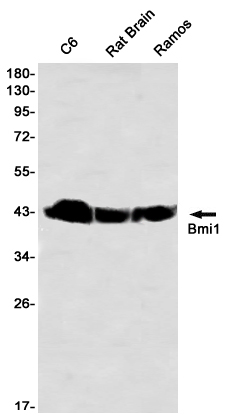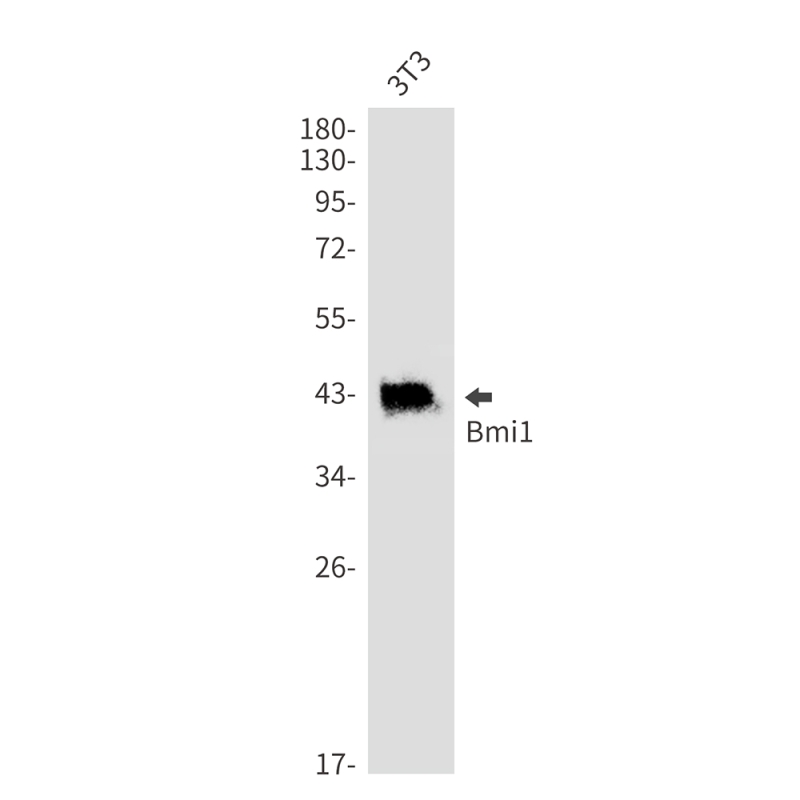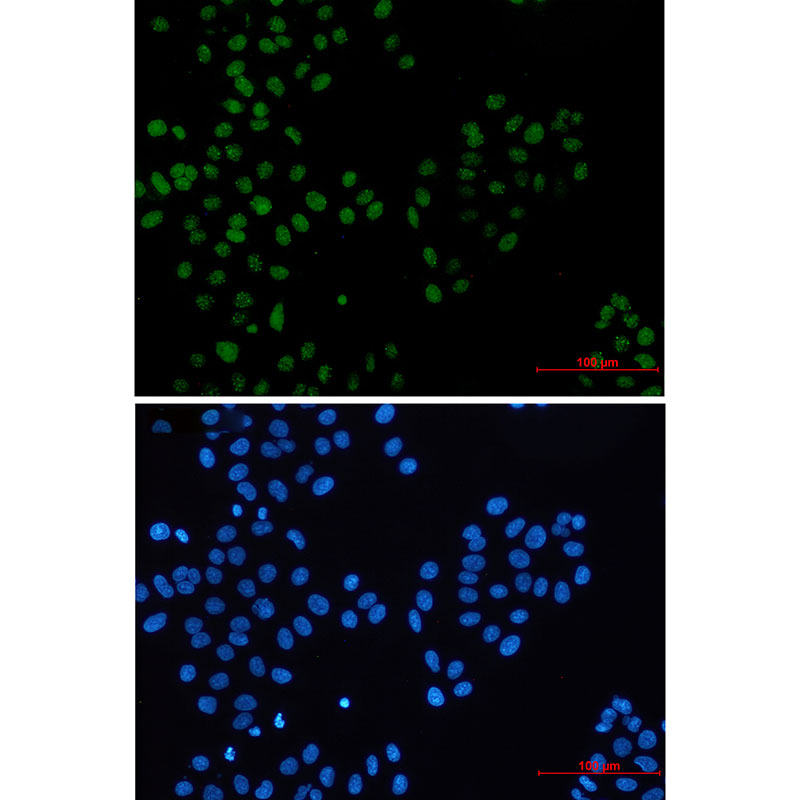


| WB | 1/500-1/1000 | Human,Mouse,Rat |
| IF | 1/20 | Human,Mouse,Rat |
| IHC | 咨询技术 | Human,Mouse,Rat |
| ICC | 1/50-1/200 | Human,Mouse,Rat |
| FCM | 咨询技术 | Human,Mouse,Rat |
| Elisa | 咨询技术 | Human,Mouse,Rat |
| Aliases | BMI1; PCGF4; RNF51; Polycomb complex protein BMI-1; Polycomb group RING finger protein 4; RING finger protein 51 |
| Entrez GeneID | 100532731 |
| WB Predicted band size | Calculated MW: 37 kDa; Observed MW: 43 kDa |
| Host/Isotype | Rabbit IgG |
| Antibody Type | Primary antibody |
| Storage | Store at 4°C short term. Aliquot and store at -20°C long term. Avoid freeze/thaw cycles. |
| Species Reactivity | Human,Mouse,Rat |
| Immunogen | Recombinant protein of human Bmi1 |
| Formulation | Purified antibody in TBS with 0.05% sodium azide,0.05%BSA and 50% glycerol. |
+ +
以下是3篇关于BMI1抗体的参考文献摘要,按发表时间排序:
---
1. **文献名称**: "BMI1 is essential in cerebellar granule cells for postnatal survival and genomic stability"
**作者**: Zencak D et al.
**摘要**: 该研究利用BMI1抗体通过免疫组化与Western blot证实BMI1蛋白在小脑颗粒细胞中的高表达。基因敲除实验显示BMI1缺失导致细胞凋亡增加与基因组不稳定,提示其在神经元维持中的关键作用。
---
2. **文献名称**: "BMI1 confers resistance to targeted therapy in EGFR-mutant non-small cell lung cancer"
**作者**: Kurppa KJ et al.
**摘要**: 研究通过流式细胞术和免疫荧光(使用BMI1单克隆抗体)发现,EGFR突变肺癌细胞中BMI1高表达与奥希替尼耐药相关。机制研究表明BMI1通过维持癌症干细胞特性促进耐药,靶向BMI1可增强治疗效果。
---
3. **文献名称**: "BMI1 Antibody Validation for Circulating Tumor Cell Detection in Colorectal Cancer"
**作者**: Zhang Y et al.
**摘要**: 该研究系统验证了多种商业BMI1抗体的特异性(包括Abcam#ab38295和Cell Signaling#6964),发现部分抗体存在非特异性结合。优化后建立的CTC检测方案显示,BMI1+循环肿瘤细胞与结直肠癌转移显著相关。
---
**补充说明**:BMI1抗体广泛用于癌症干细胞、表观遗传调控及治疗抵抗研究,选择抗体时需注意物种特异性(人/小鼠)和应用场景(IHC/WB/IF)。近年的研究趋势集中在BMI1与免疫微环境互作(如2023年Nature Cancer相关论文)。
BMI1 (B-cell-specific Moloney murine leukemia virus integration site 1) is a crucial regulatory protein encoded by the *BMI1* gene, belonging to the Polycomb group (PcG) family. It serves as a core component of the Polycomb repressive complex 1 (PRC1), which plays a pivotal role in epigenetic regulation by maintaining gene silencing through histone modification. Specifically, BMI1 facilitates the ubiquitination of histone H2A at lysine 119 (H2AK119ub), promoting chromatin compaction and transcriptional repression of target genes involved in cell cycle control, stem cell self-renewal, and differentiation.
BMI1 is essential for sustaining the pluripotency of embryonic and adult stem cells, and its dysregulation is linked to cancer development. Overexpression of BMI1 is observed in various malignancies, including leukemia, breast, and prostate cancers, where it drives uncontrolled proliferation, inhibits apoptosis, and promotes tumorigenesis by silencing tumor suppressor genes like *p16INK4a* and *p14ARF*.
BMI1 antibodies are widely used in research to detect and quantify BMI1 protein levels in cells and tissues. They are critical tools for studying its expression patterns, interaction partners, and epigenetic mechanisms in both normal physiology and disease contexts. Applications include Western blotting, immunohistochemistry (IHC), immunofluorescence (IF), and chromatin immunoprecipitation (ChIP). Understanding BMI1's role has therapeutic implications, particularly in targeting cancer stem cells and overcoming therapy resistance.
×